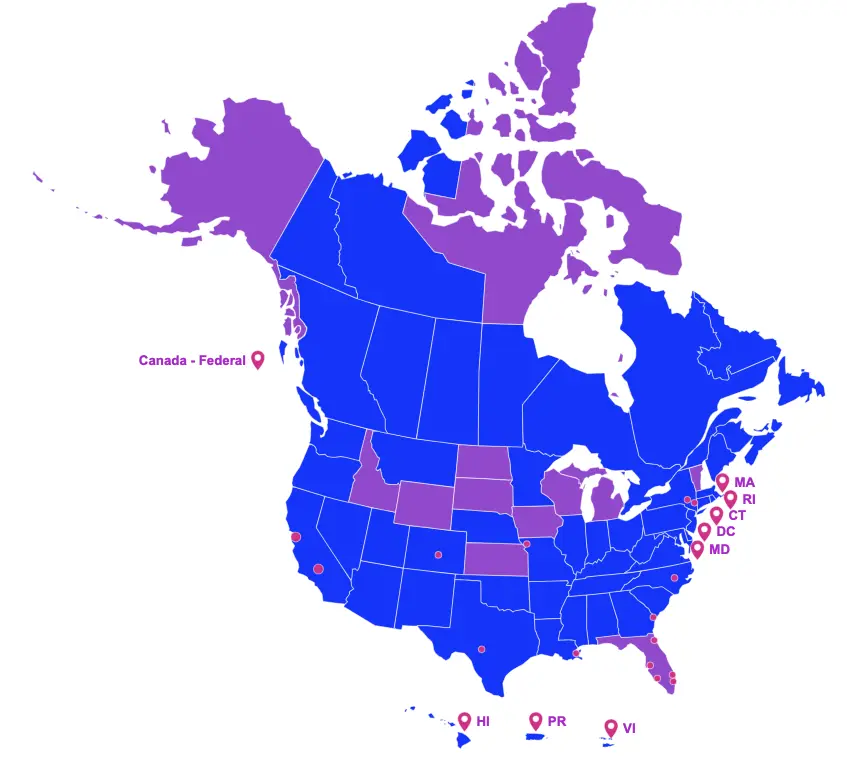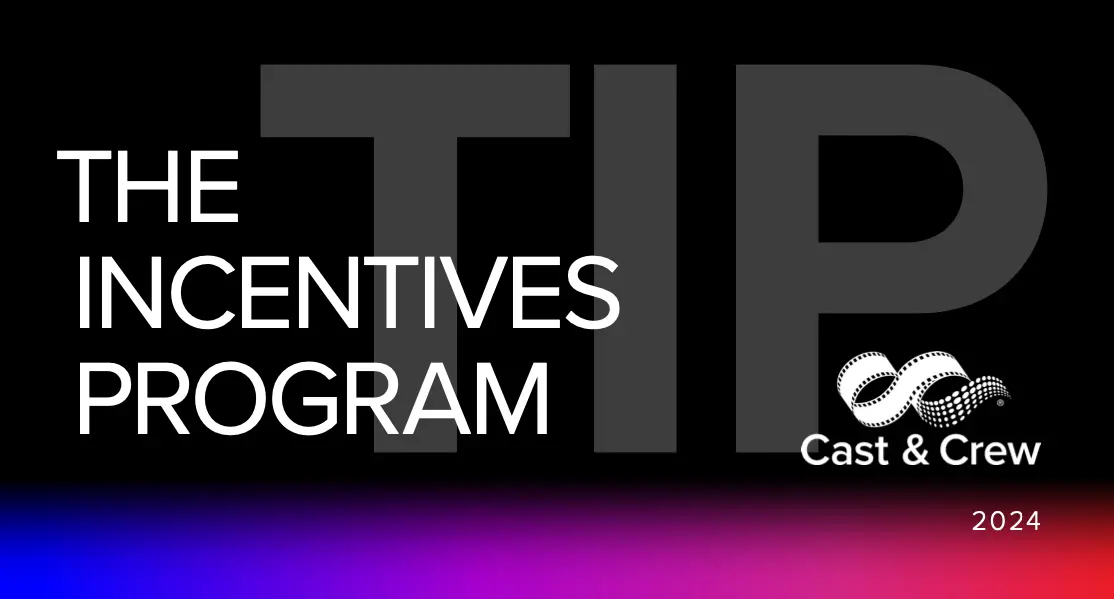THE INCENTIVES PROGRAM - TIP
A first look at our newsletter.
Cast & Crew Financial Services (CCFS) offers both U.S. and Canadian production incentive management services from setup to audit, as well as production incentive financing.
ENACTED LEGISLATION
Signed by the Governor
California
On July 10, 2023, Governor Gavin Newsom signed Senate Bill 132 into law, thereby amending the California film tax credit “3.0” program and creating a “4.0” film tax credit program. Details are as follows:
Program 3.0 and Soundstage Tax Credit
- Provides tax credits for tax years 2022 through 2031, for the production of a qualified motion picture in the state at a certified studio construction project involving the construction or modification of one or more soundstages in the state;
- Amends the soundstage credit as follows:
- A project must be certified by the Commission for a period of five years instead of three years;
- Reduces the qualified wages requirement a motion picture must pay or incur during the production period, from at least $7.5 million to $5 million in qualified wages;
- Removes requirement of wages needing to be paid or incurred in the taxable year that the credit is claimed;
- Stipulates that the diversity workplan for the production must consider disability status, in addition to existing requirements; and
- Modifies the aggregate amount of credits that may be allocated to a motion picture from $12 million for a season of a series or a feature film, to $12 million to any qualified motion picture or $750,000 per episode for a season of a television series;
- For tax years beginning after 2022, allows for a qualified motion picture that satisfies the criteria for the soundstage credit but does not receive that credit for specified reasons to apply for a motion picture production credit allocation, and for a recurring television series that satisfies the criteria for the soundstage credit but is no longer eligible for that credit to receive a motion picture production credit allocation.
Program 4.0 Tax Credit – January 1, 2025
- Carries over the existing motion picture credit tax credit amount of 20% to 25% (plus uplifts) of qualified expenditures in California for taxable years;
- Carries over $330 million per fiscal year (7/1 – 6/30) funding cap;
- Requires the California Film Commission (CFC) to certify 96% of the total credit allocated to the applicant (other than an independent films with $10 million or less of qualified spend), unless the applicant chooses to submit a diversity workplan;
- Allows the CFC to certify an additional 4% of the total credit allocated to the applicant if the applicant submits a diversity workplan within 30 days after receiving a credit allocation letter;
- Allows a taxpayer to make a one-time election to receive the tax credit as a refund, as follows:
- Refund election must be made on an original timely filed return for the year the credit certificate is issued;
- Election for a refund is irrevocable;
- The “total refundable amount” is equal to 90% of the credit amount that exceeds the “net tax” in the first taxable year that the credit certificate is issued;
- The “annual refundable amount” is equal to 20% of the total refundable amount;
- The refundable claim is made in the first year that the credit certificate was issued and the succeeding four taxable years;
- Establishes a Continuing a Career Pathways Program which will be funded by a fee equal to 0.5% (0.25% for an independent film) of the approved credit, with the option, beginning on January 1, 2028 of increasing the fee by 0.25% per year (for all productions except independent films), up to 1 percent of the approved credit;
- Establishes a Safety on Productions Pilot Program, commencing July 1, 2025, until June 30, 203, to address the implementation and oversight of safety practices and procedures for projects participating in the pilot program; and,
- Extends sunset date to June 30, 2030.
Minnesota
On May 24, 2023, Governor Tim Walz signed House Bill 1938 into law, amending Minnesota’s Film Production Tax Credit program as follows:
- Increases program funding from $4.950 million per calendar year to $24.950 million per calendar year;
- Extends the sunset date from December 31, 2024, to December 31, 2030; and,
- Redefines the minimum spend requirement from at least $1 million in the taxable year to at least $1 million in a consecutive 12-month period beginning when expenditures are first paid in Minnesota for eligible production costs.
Ohio
On July 4, 2023, Governor Mike DeWine signed House Bill 33 into law, thereby amending the Ohio motion picture tax credit program as follows:
- Increases the annual funding from $40 million to $50 million per fiscal year (7/1 – 6/30);
- Allocates $5 million of the $50 million for Broadway theatrical productions;
- Awards the credits in two rounds: the first round of credits shall be awarded not later than the last day of July of the fiscal year, and the second round of credits shall be awarded not later than the last day of the ensuing January; and,
- Establishes a refundable credit capital improvement project program for the purpose of encouraging and developing strong film and theater industries in Ohio.
Oklahoma
On June 7, 2023, Governor Kevin Stitt signed House Bill 2459 into law, thereby amending the Oklahoma Film Incentive Rebate program as follows:
- Stipulates that the maximum incentive that may be earned on qualified expenditure is 30% and that no uplifts may be earned on labor costs;
- Increases the nonresident below-the-line wage rebate (employees and loan outs), from 7.5% to 20% of wages paid on or after April 1, 2023;
- Amends the requirement associated with the 2% bump for a project 1) whose hub is located in, or 2) that films at least 25% of principal photography days, in a municipality with 13,000 or fewer persons to a municipality with 25,000 or fewer persons;
- Reduces the incentive associated with postproduction costs for music production, recording, mixing, or composition, or licensing of Oklahoma music from the 3% to 2%;
- Expands qualified wages to include wages of persons who are enrolled as full-time students at a college or university located in the state offering an undergraduate degree program or who are on active military duty and stationed in Oklahoma or involved in a restorative workforce program; and,
- Modifies the end credit requirement by stipulating the approved logo must be displayed in the credits of the finished production for a period of at least five seconds.


